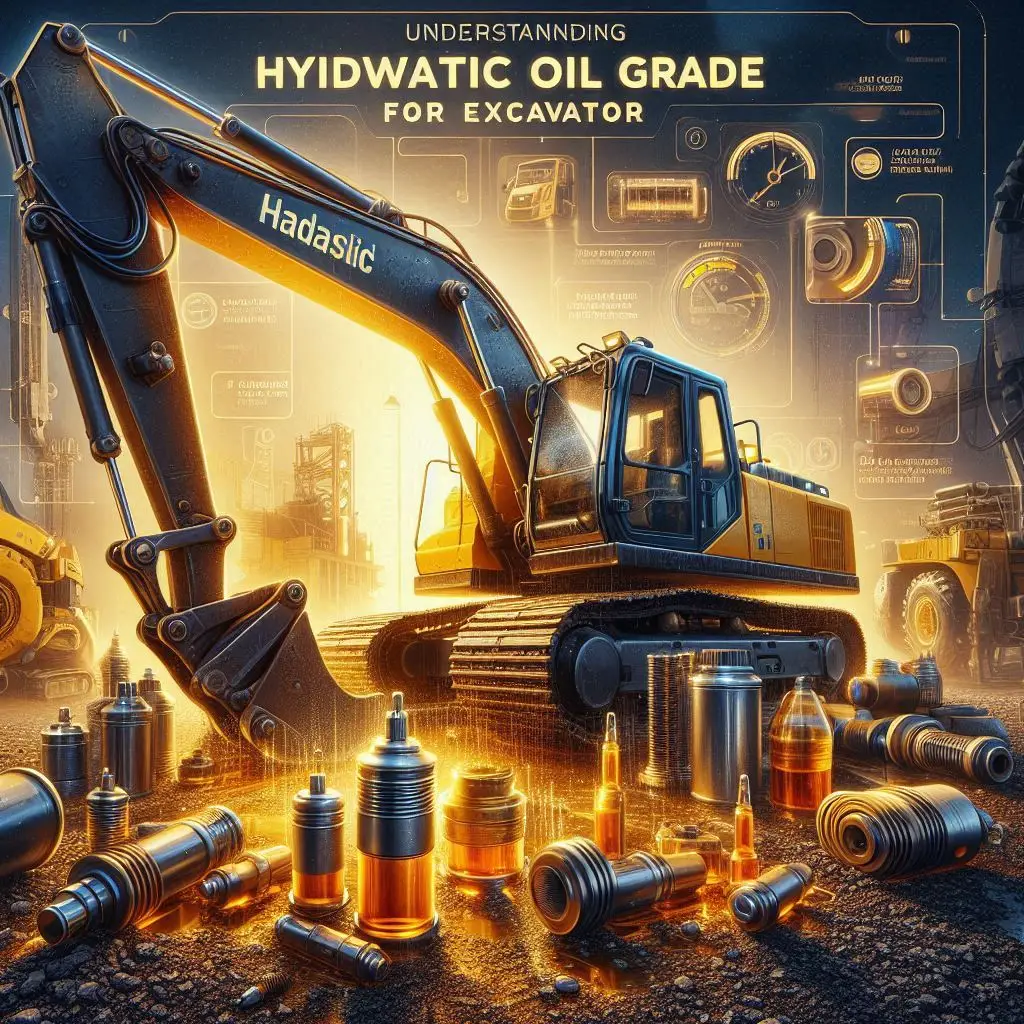
Hydraulic oil grade for excavator
Hydraulic oil is the lifeblood of an excavator’s hydraulic system. It helps disperse heat, lubricates moving components, and transfers power.
Choosing the right hydraulic oil grade is critical for optimal performance, longevity, and reliability of your excavator. This guide will delve into the essential aspects of hydraulic oil grades, factors affecting the choice, and their implications for excavators.
Understanding Hydraulic Oil Grades
Hydraulic oil grades are determined based on viscosity, which is the oil’s resistance to flow. Viscosity is usually measured in centistokes (cSt) at 40°C and 100°C. The International Organization for Standardization (ISO) classifies hydraulic oils by their viscosity grades, typically ranging from ISO VG 10 to ISO VG 150. For excavators, the most commonly used grades are ISO VG 32, ISO VG 46, and ISO VG 68.
ISO VG 32
· Viscosity: 28.8 to 35.2 cSt at 40°C.
· Usage: Suitable for colder climates where low-temperature fluidity is essential.
ISO VG 46
· Viscosity: 41.4 to 50.6 cSt at 40°C.
· Usage: A versatile grade used in moderate climates and provides a good balance between cold start performance and operating viscosity.
ISO VG 68
· Viscosity: 61.2 to 74.8 cSt at 40°C.
· Usage: Ideal for hotter climates and high-load applications due to its higher viscosity.
Factors Influencing Hydraulic Oil Grade Selection
Operating Temperature
· Cold Climates: Lower viscosity grades like ISO VG 32 are preferable as they flow better at low temperatures, ensuring adequate lubrication during startup.
· Hot Climates: Higher viscosity grades such as ISO VG 68 are better suited because they maintain optimal viscosity at elevated temperatures, ensuring consistent performance and protection.
Load and Pressure Conditions
· High Loads and Pressures: Higher viscosity oils (ISO VG 46 or VG 68) are more suitable as they provide better film strength and reduce the risk of metal-to-metal contact under heavy load conditions.
· Normal Loads and Pressures: ISO VG 32 or VG 46 can be used, offering a balance between fluidity and protective film strength.
Manufacturer Specifications
· Always refer to the excavator’s manual for recommended oil grades. Manufacturers conduct extensive testing to determine the optimal oil grade for their equipment, considering factors like pump type, system design, and typical operating conditions.
Environmental Considerations
· Biodegradable Oils: In environmentally sensitive areas, biodegradable hydraulic oils, which are often based on ISO VG 46 or VG 68 grades, may be required to minimize environmental impact in case of leaks or spills.
Oil Additives
· Additives enhance the performance of hydraulic oils. Anti-wear additives, oxidation inhibitors, rust and corrosion inhibitors, and anti-foam agents are crucial for maintaining the efficiency and longevity of the hydraulic system. Ensure the oil grade chosen contains the appropriate additives for your specific application.
Common Hydraulic Oils and Their Applications
Mineral-Based Hydraulic Oils
· Properties: Good balance of performance and cost, suitable for general use.
· Example: Shell Tellus S2 MX (available in ISO VG 32, 46, 68).
Synthetic Hydraulic Oils
· Properties: Superior thermal stability, oxidation resistance, and performance in extreme temperatures.
· Example: Mobil DTE 10 Excel (available in ISO VG 32, 46, 68).
Biodegradable Hydraulic Oils
· Properties: Environmentally friendly, suitable for use in sensitive areas.
· Example: Panolin HLP Synth (available in ISO VG 46, 68).
Practical Considerations and Maintenance
Regular Oil Analysis
· Conducting periodic oil analysis helps in monitoring the oil condition and detecting contamination, wear particles, and changes in viscosity. This practice can prevent potential failures and extend the life of the hydraulic system.
Proper Storage and Handling
· Store hydraulic oil in a clean, dry place to prevent contamination. Use clean containers and funnels during oil changes to maintain oil purity.
Scheduled Maintenance
· For oil changes and filter replacements, adhere to the manufacturer's suggested maintenance plan. Regular maintenance ensures the hydraulic system remains free of contaminants and operates efficiently.
Contamination Control
· Contaminants like dirt, water, and air can significantly affect hydraulic oil performance. Use proper seals, breathers, and filters to keep the system clean.
Future Trends in Hydraulic Oil Development
The future of hydraulic oil development is moving towards more advanced formulations that offer enhanced performance and sustainability. Innovations such as nanotechnology additives promise to improve lubrication properties and reduce wear. Additionally, there is a growing emphasis on environmentally friendly hydraulic oils, including more efficient biodegradable options and oils derived from renewable resources. These advancements aim to reduce environmental impact and improve the overall efficiency and longevity of hydraulic systems. As the industry evolves, staying informed about these trends will be crucial for optimizing the performance and sustainability of your excavator’s hydraulic system.
Conclusion
Maintaining the lifespan, performance, and efficiency of your excavator depends on selecting the proper hydraulic oil grade.
The primary factors influencing this choice are the operating temperature, load and pressure conditions, manufacturer specifications, environmental considerations, and the presence of suitable additives. For most excavators, ISO VG 32, 46, and 68 are the preferred grades, with a specific choice depending on the operating environment and application demands.
Mineral-based, synthetic, and biodegradable hydraulic oils each have their advantages, and the selection should align with the specific needs of your equipment and operational conditions. Regular maintenance, including oil analysis, proper storage, and contamination control, will ensure the hydraulic system functions smoothly and reliably.
By understanding and applying these principles, you can ensure that your excavator’s hydraulic system performs at its best, reducing downtime and maintenance costs while maximizing productivity and operational efficiency.

